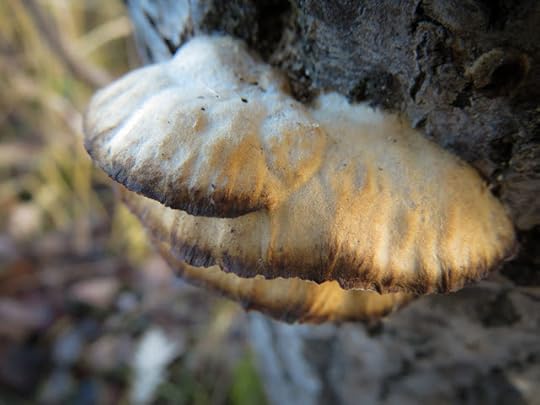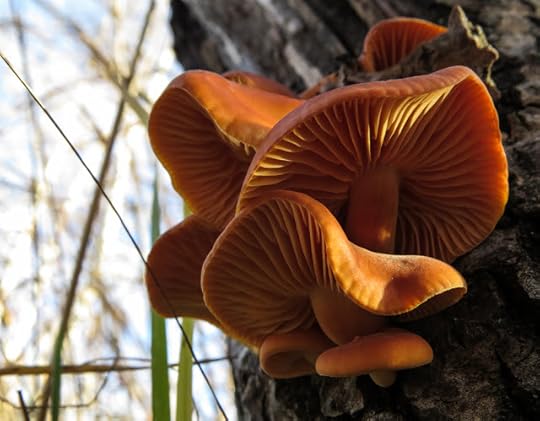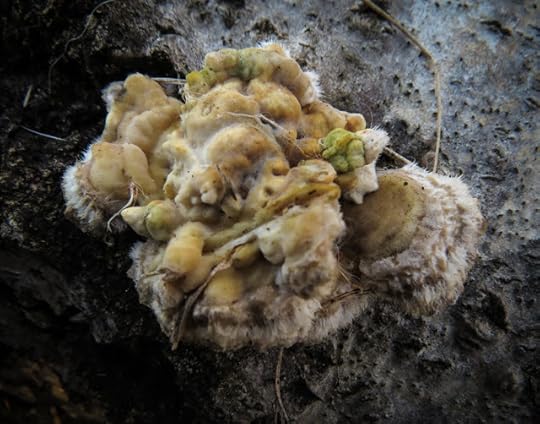Ariel Gordon's Blog, page 14
November 15, 2015
crisped
Published on November 15, 2015 08:38
cluster
Published on November 15, 2015 08:36
tissue
Published on November 15, 2015 08:35
forested
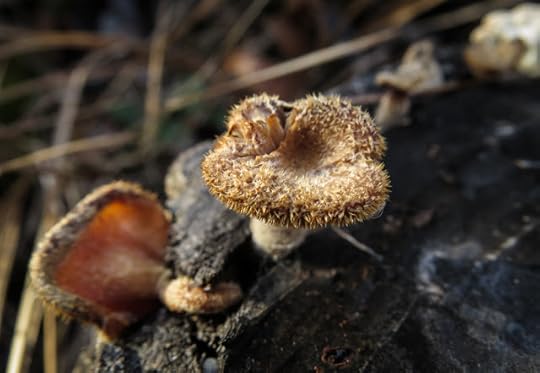 All photos November 13-15, 2015. Assiniboine Forest, Wpg, MB * * *
All photos November 13-15, 2015. Assiniboine Forest, Wpg, MB * * *It was one of those good weekends: two visits to Assiniboine Forest in three days. One walk was with M and one was by myself, but both were sunny and warm (i.e. atypical November) walks.
It had been a while since since I'd been to the forest. These days, I'm either walking during the girl's lessons or during the course of a writing day. So: either inside or adjacent to my neighbourhood. I haven't noticed a "forest deficit," because I was exercizing more than normal and, also, the Wolseley/Wellington loop, my 'local,' is both varied—two neighbourhoods, two bridges, the river—and treed.
Changing my patterns around how and where I walk was logical: I was spending less time getting to and from the forest, which is a half-hour from my house, and so more time writing. What's more, I could have a satisfying walk under the trees in an hour instead of an entire afternoon.
What I forgot, of course, is that the forest gives more than a treed suburb could. More and varied trees in a density you just don't get on a boulevard or in someone's yard. Even the riverbank forests on view from the Maryland and Omand's Creek bridges don't compare.
Assiniboine Forest also has a diverse understory, with shrubs, plants, and mushrooms and wildlife that inhabits that understory. For instance, I saw a deer, a marten, and a northern goshawk on my Sunday solo walk. I was so excited when I finished my walk, spending 5 minutes identifying the marten and goshawk in my Tracking and Scat and Manitoba Birds books and then another 40 minutes writing about the experience.
I felt illuminated, somehow lit from within: the gold/orange glint of the marten's coat, how the white-tail deer bounded into the trees, the brown-streaked breast of the goshawk. I've seen a few deer and raptors on my circuits of the W/W loop, but mostly I see people, dogs, and cars.
And then there were the new mushrooms I found that I'm sharing here...
It was good to return to the forest, to refresh my ardour, and it was a great start to the Assiniboine Forest-focussed project that M and I are beginning.
Published on November 15, 2015 08:09
November 12, 2015
Out-of-Town-Authors: Alice Major
Though I've never worked with Alice Major, I consider her to be a mentor of sorts.
In addition to writing more than a dozen books, Alice is a good example on how to be committed to a place—Edmonton, Alberta—and to a community—poetry.

She was the first poet laureate in Edmonton, for instance, and, during her term, founded the Edmonton Poetry Festival.
Another notable trait is that Alice is kind until she is forced not-to-be. I've seen her raise her voice when organizations veer into the stupidly-impractical or needlessly-complicated.
And so I was pleased to have the chance to interview her about her latest collection, published by the University of Alberta Press as part of their Robert Kroetsch Series. (Can I say again how much I miss Robert Kroetsch?)
What do you want people to know about Standard Candles? (What IS a “standard candle”?)
A standard candle is something you can use to measure distance. The principle is fairly straightforward—if you have two 100-W light bulbs and one looks fainter than the others, then you know the fainter one is further away. Astronomers look for things in the sky that they know have a defined brightness—certain kinds of stars and supernovae—and then measure that brightness to figure out how big all this is. So ideas that percolate through the book are about distances (including distance to the dead), and finding our place in the vastly expanded cosmos that astronomers are measuring.
I hope people will find the book both playful and serious. We've been making up stories about how all this came to be for the whole of human history, and those narratives have important consequences for how we view the world. Cosmology has been something that poets have been playing around with since the days of Homer, and I just wanted to be part of that tradition.
Tell me about working on this book with Peter Midgley at University of Alberta Press.
Peter is a lovely editor to work with. He didn't feel the manuscript needed any significant restructuring or alteration, but he is great at querying a word choice here or a bumpy line there. He is also really good at spotting punctuation inconsistencies. (Yes, poets do need to pay attention to punctuation.)
What did your experience working as a weekly newspaper reporter early in your career teach you about writing?
You can't get precious or constipated about writing when you work for a weekly paper and the editor is screaming, 'There's no copy on the hook!' I had always written in journals as the spirit sporadically moved me, but being the senior reporter for the Williams Lake Tribune didn't give you time to wait for inspiration. It was like one of those poetry loosening-up exercises where you just put pen on paper and fill it with any words that roll out. Only these words had to be organized in complete sentences and carry information. I think it was the best training I could have had—just bash something down and see what you can make out of it.
Now that you’ve published 11 collections of poetry as well as a book of essays on art and science, what have you learned about the writing-of-poetry?
I think poetry needs content as well as form! For me, a poem needs to say something interesting, make a connection that hasn't been made in the pages of countless litmags already. That's why I turn to science a lot—as Shelley said when asked why he went meetings of the Royal Society, "I go to replenish my store of metaphor."
By "something interesting" I don't mean "something completely original never thought in the history of humanity." Originality is a terrible burden to lay on poets. But our brains are designed to associate different things together; metaphor lies at the basis not only of language but perception. Certain associations tend to stick because they're very useful; they become habits of thought. It's much more interesting when you get out of the ruts. Which is why research helps me; it gives me new things to connect with my very ordinary life and living room.
What have you learned about your own process between the Williams Lake Tribune and Standard Candles?
I am fortunate—I really like writing. But I've accepted that I don't like writing all the time. I've realized over the years that there's a certain amount that comes out of me at a reasonably steady rate. I get cross if I'm not able to write at all. But if I give myself lots of time, I don't necessarily write any more, and in fact I end up wasting the time. So I might as well put board meetings or other commitments on my calendar and get out into the world.
What’s important for you now as a writer? As a member of Edmonton’s (and Canada’s) literary community?
For me personally? I think the most important thing is how to keep challenging myself. How do I avoid writing poems I've already written? Of course we go on exploring certain themes and ideas throughout our lives, and we tend to bring a certain attitude to the world and a particular 'voice' into our work. But often I find myself scribbling a stanza and think, "Oh, Alice, you've done this idea in pretty much this way before." So one of the things I have been doing more of is going back to traditional forms. In Standard Candles, there are Spenserian stanzas and terza rima, sonnets and ballads, and nonce forms that just seem to suit particular poems. It may seem strange to some people that you'd use sonnets to be 'new', but I find it stimulating. There's something strangely freeing about having to find a rhyme—it can lead you to images and ideas you just didn't expect to combine.
As for being part of literary community—well to me it's essential. We don't do this alone; as poets we have to be in a constant dialogue with the others who practice this art form, present and past. Also, I think poetry is essential to our health as a society, as is all art. Participating in art-making is good for our physical and emotional health as individuals and it's essential for social cohesion. I'm not an "art-for-art's sake" kind of gal. It's a false dichotomy to say that the arts should be kept apart from having a social function. That implies an unbridgeable gulf between the amateur and the "real" artist, that most of us should just sit back and read what the important poets write or listen to what the popular musicians play. We all exist along the spectrum, and all of us benefit from participating in this most human of activities. So I tend to focus on helping my own city's poetry community; it's one way to resist the hyper-commodification of art that comes streaming in at us on all channels. Live local!
Speaking of which, have you ever been to Winnipeg? What have you heard?
I was in Winnipeg just this past summer, for the League of Poets annual meeting. And so I heard poetry!
What are you reading right now? What are you writing right now?
I'm reading Gwynneth Lewis's Quantum Poetics, three lectures she gave at Newcastle University's public lecture series. She was the first poet laureate for Wales and a writer who also goes to science a great deal for inspiration. And I've just finished Not by Genes Alone: How Culture Transformed Human Evolution, by Peter Richerson and Robert Boyd.
And I'm writing a long didactic response to Alexander Pope's Essay on Man. The time seemed right.
In addition to writing more than a dozen books, Alice is a good example on how to be committed to a place—Edmonton, Alberta—and to a community—poetry.

She was the first poet laureate in Edmonton, for instance, and, during her term, founded the Edmonton Poetry Festival.
Another notable trait is that Alice is kind until she is forced not-to-be. I've seen her raise her voice when organizations veer into the stupidly-impractical or needlessly-complicated.
And so I was pleased to have the chance to interview her about her latest collection, published by the University of Alberta Press as part of their Robert Kroetsch Series. (Can I say again how much I miss Robert Kroetsch?)
What do you want people to know about Standard Candles? (What IS a “standard candle”?)
A standard candle is something you can use to measure distance. The principle is fairly straightforward—if you have two 100-W light bulbs and one looks fainter than the others, then you know the fainter one is further away. Astronomers look for things in the sky that they know have a defined brightness—certain kinds of stars and supernovae—and then measure that brightness to figure out how big all this is. So ideas that percolate through the book are about distances (including distance to the dead), and finding our place in the vastly expanded cosmos that astronomers are measuring.
I hope people will find the book both playful and serious. We've been making up stories about how all this came to be for the whole of human history, and those narratives have important consequences for how we view the world. Cosmology has been something that poets have been playing around with since the days of Homer, and I just wanted to be part of that tradition.
Tell me about working on this book with Peter Midgley at University of Alberta Press.
Peter is a lovely editor to work with. He didn't feel the manuscript needed any significant restructuring or alteration, but he is great at querying a word choice here or a bumpy line there. He is also really good at spotting punctuation inconsistencies. (Yes, poets do need to pay attention to punctuation.)
What did your experience working as a weekly newspaper reporter early in your career teach you about writing?
You can't get precious or constipated about writing when you work for a weekly paper and the editor is screaming, 'There's no copy on the hook!' I had always written in journals as the spirit sporadically moved me, but being the senior reporter for the Williams Lake Tribune didn't give you time to wait for inspiration. It was like one of those poetry loosening-up exercises where you just put pen on paper and fill it with any words that roll out. Only these words had to be organized in complete sentences and carry information. I think it was the best training I could have had—just bash something down and see what you can make out of it.
Now that you’ve published 11 collections of poetry as well as a book of essays on art and science, what have you learned about the writing-of-poetry?
I think poetry needs content as well as form! For me, a poem needs to say something interesting, make a connection that hasn't been made in the pages of countless litmags already. That's why I turn to science a lot—as Shelley said when asked why he went meetings of the Royal Society, "I go to replenish my store of metaphor."
By "something interesting" I don't mean "something completely original never thought in the history of humanity." Originality is a terrible burden to lay on poets. But our brains are designed to associate different things together; metaphor lies at the basis not only of language but perception. Certain associations tend to stick because they're very useful; they become habits of thought. It's much more interesting when you get out of the ruts. Which is why research helps me; it gives me new things to connect with my very ordinary life and living room.
What have you learned about your own process between the Williams Lake Tribune and Standard Candles?
I am fortunate—I really like writing. But I've accepted that I don't like writing all the time. I've realized over the years that there's a certain amount that comes out of me at a reasonably steady rate. I get cross if I'm not able to write at all. But if I give myself lots of time, I don't necessarily write any more, and in fact I end up wasting the time. So I might as well put board meetings or other commitments on my calendar and get out into the world.
What’s important for you now as a writer? As a member of Edmonton’s (and Canada’s) literary community?
For me personally? I think the most important thing is how to keep challenging myself. How do I avoid writing poems I've already written? Of course we go on exploring certain themes and ideas throughout our lives, and we tend to bring a certain attitude to the world and a particular 'voice' into our work. But often I find myself scribbling a stanza and think, "Oh, Alice, you've done this idea in pretty much this way before." So one of the things I have been doing more of is going back to traditional forms. In Standard Candles, there are Spenserian stanzas and terza rima, sonnets and ballads, and nonce forms that just seem to suit particular poems. It may seem strange to some people that you'd use sonnets to be 'new', but I find it stimulating. There's something strangely freeing about having to find a rhyme—it can lead you to images and ideas you just didn't expect to combine.
As for being part of literary community—well to me it's essential. We don't do this alone; as poets we have to be in a constant dialogue with the others who practice this art form, present and past. Also, I think poetry is essential to our health as a society, as is all art. Participating in art-making is good for our physical and emotional health as individuals and it's essential for social cohesion. I'm not an "art-for-art's sake" kind of gal. It's a false dichotomy to say that the arts should be kept apart from having a social function. That implies an unbridgeable gulf between the amateur and the "real" artist, that most of us should just sit back and read what the important poets write or listen to what the popular musicians play. We all exist along the spectrum, and all of us benefit from participating in this most human of activities. So I tend to focus on helping my own city's poetry community; it's one way to resist the hyper-commodification of art that comes streaming in at us on all channels. Live local!
Speaking of which, have you ever been to Winnipeg? What have you heard?
I was in Winnipeg just this past summer, for the League of Poets annual meeting. And so I heard poetry!
What are you reading right now? What are you writing right now?
I'm reading Gwynneth Lewis's Quantum Poetics, three lectures she gave at Newcastle University's public lecture series. She was the first poet laureate for Wales and a writer who also goes to science a great deal for inspiration. And I've just finished Not by Genes Alone: How Culture Transformed Human Evolution, by Peter Richerson and Robert Boyd.
And I'm writing a long didactic response to Alexander Pope's Essay on Man. The time seemed right.
Published on November 12, 2015 08:37
November 11, 2015
A bunch of goonies
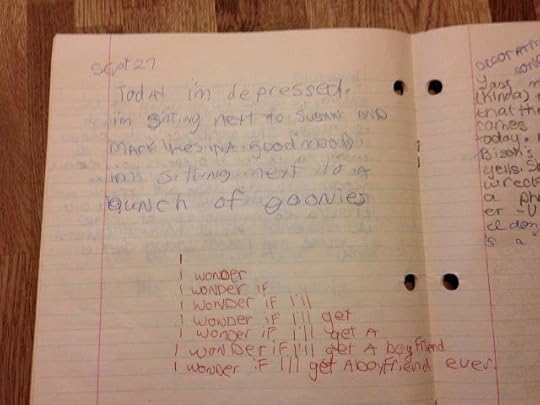
* * *
So I signed up to read at the Winnipeg edition (November 15 at 3:30 pm) of CBC's Grownups Read Things They Wrote as Kids...and spent part of the afternoon humbly contemplating my grade six Language Arts journal.
Is it any surprise I wound up as a poet?
Published on November 11, 2015 19:17
November 7, 2015
Out-of-Town-Authors: Nino Ricci
Winnipeg Free Press—PRINT EDITION
By Ariel Gordon
Toronto-based writer Nino Ricci is the son of Italian immigrants.
In addition to his five novels—two of which won the Governor General's Award for Fiction—Ricci has written a biography of Pierre Elliott Trudeau.
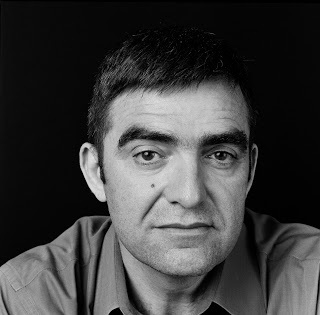 Kevin Kelly Photography
Kevin Kelly Photography
Ricci was in Winnipeg recently, launching his sixth novel, Sleep. He took the time to speak to Ariel Gordon.
FP: What do you want people to know about Sleep?
 Nino Ricci: While there is a lot in the novel that is actually about sleep, which turns out to be a good deal more important to us than most of us might have guessed, the question of sleep is also a stepping-off point for looking at a whole range of other issues, such as the lies we tell ourselves in order to live with ourselves, the mistakes we make over and over, and whether many of us, in fact, spend much of our waking lives in a kind of sleep, fiddling like Nero while the planet burns.
Nino Ricci: While there is a lot in the novel that is actually about sleep, which turns out to be a good deal more important to us than most of us might have guessed, the question of sleep is also a stepping-off point for looking at a whole range of other issues, such as the lies we tell ourselves in order to live with ourselves, the mistakes we make over and over, and whether many of us, in fact, spend much of our waking lives in a kind of sleep, fiddling like Nero while the planet burns.
FP: Sleep seems to work with some of the same ideas that some of the smarter zombie books/movies do—Edgar Wright's 2009 feature Shaun of the Dead, with its satiric look at lower-middle-class England, comes to mind—that people have become tech-obsessed, full of misdirected rage at perceived slights and the sense that nothing they do really matters. What prompted you to work with these quasi-apocalyptic ideas? And how, do you think, is Sleep a progression or deviation from your previous work?
NR: I haven't actually seen Shaun of the Dead, but the comparison sounds right. I suspect the apocalyptic impulse is hard-wired into the human brain. It seems nearly every age likes to imagine itself at the brink either of Armageddon or the New Jerusalem, or of both. As a good Catholic boy I had such notions bred into me early, and spent much of my childhood awaiting the Second Coming and indeed secretly hoping I might be it. So apocalypse has always been there in my thinking; it has just taken me awhile to be up front about it. I see Sleep as following very naturally from ideas I started developing in my novels Testament and The Origin of Species, ideas that have less to do, I think, with the actual prospect of annihilation than with our obsession with it, and how time and again we seem to drive ourselves toward it despite our best intentions.
FP: Sleep is your eighth book in since Lives of the Saints was published in 1990. What are your goals for your writing now, as compared to your first books?
NR: My goals for my writing have not changed so much: to keep asking new questions and to keep setting new challenges. Ultimately what most novelists strive for, I think, is to find some way to hold the whole world—that was true for me at the start and remains true now. Since that isn't a goal I can ever really hope to reach, I guess it means I will just have to keep failing better at it, as Beckett put it.
FP: You wrote a biography of Pierre Elliot Trudeau that was published in 2009. Did it give you any particular insights into the recent federal election?
NR: I'm not sure it is advisable to ask a novelist for insights on federal politics. Let me just say that I'm very happy to see the country emerge from The Great Darkness of the Harper years, and wish Trudeau fils the very best.
FP: Tell me about your parents' influence on your thinking, on your work ethic, on your writing.
NR: When I was young, of course, I wanted to be nothing like my parents. In many ways I am nothing like them, though mainly because all their hard work gave me a chance to pursue the sort of life they never had a shot at. Then so much of what drives me and of what I write about goes back to what I learned through them or to what their own lives exposed me to. We talk a lot about the immigrant experience in this country but I think we have yet to appreciate the true enormity of it, not just the rupture and dislocation that goes with it but also the incredible sense of possibility.
FP: What are you reading right now? What are you writing right now?
NR: Right now I'm reading The Eminent Victorians by Lytton Strachey and Martin John by Anakana Schofield. As for my writing, I've been getting a start on a novel set in Edwardian England.
Ariel Gordon is a Winnipeg writer.
By Ariel Gordon
Toronto-based writer Nino Ricci is the son of Italian immigrants.
In addition to his five novels—two of which won the Governor General's Award for Fiction—Ricci has written a biography of Pierre Elliott Trudeau.
 Kevin Kelly Photography
Kevin Kelly Photography Ricci was in Winnipeg recently, launching his sixth novel, Sleep. He took the time to speak to Ariel Gordon.
FP: What do you want people to know about Sleep?
 Nino Ricci: While there is a lot in the novel that is actually about sleep, which turns out to be a good deal more important to us than most of us might have guessed, the question of sleep is also a stepping-off point for looking at a whole range of other issues, such as the lies we tell ourselves in order to live with ourselves, the mistakes we make over and over, and whether many of us, in fact, spend much of our waking lives in a kind of sleep, fiddling like Nero while the planet burns.
Nino Ricci: While there is a lot in the novel that is actually about sleep, which turns out to be a good deal more important to us than most of us might have guessed, the question of sleep is also a stepping-off point for looking at a whole range of other issues, such as the lies we tell ourselves in order to live with ourselves, the mistakes we make over and over, and whether many of us, in fact, spend much of our waking lives in a kind of sleep, fiddling like Nero while the planet burns.FP: Sleep seems to work with some of the same ideas that some of the smarter zombie books/movies do—Edgar Wright's 2009 feature Shaun of the Dead, with its satiric look at lower-middle-class England, comes to mind—that people have become tech-obsessed, full of misdirected rage at perceived slights and the sense that nothing they do really matters. What prompted you to work with these quasi-apocalyptic ideas? And how, do you think, is Sleep a progression or deviation from your previous work?
NR: I haven't actually seen Shaun of the Dead, but the comparison sounds right. I suspect the apocalyptic impulse is hard-wired into the human brain. It seems nearly every age likes to imagine itself at the brink either of Armageddon or the New Jerusalem, or of both. As a good Catholic boy I had such notions bred into me early, and spent much of my childhood awaiting the Second Coming and indeed secretly hoping I might be it. So apocalypse has always been there in my thinking; it has just taken me awhile to be up front about it. I see Sleep as following very naturally from ideas I started developing in my novels Testament and The Origin of Species, ideas that have less to do, I think, with the actual prospect of annihilation than with our obsession with it, and how time and again we seem to drive ourselves toward it despite our best intentions.
FP: Sleep is your eighth book in since Lives of the Saints was published in 1990. What are your goals for your writing now, as compared to your first books?
NR: My goals for my writing have not changed so much: to keep asking new questions and to keep setting new challenges. Ultimately what most novelists strive for, I think, is to find some way to hold the whole world—that was true for me at the start and remains true now. Since that isn't a goal I can ever really hope to reach, I guess it means I will just have to keep failing better at it, as Beckett put it.
FP: You wrote a biography of Pierre Elliot Trudeau that was published in 2009. Did it give you any particular insights into the recent federal election?
NR: I'm not sure it is advisable to ask a novelist for insights on federal politics. Let me just say that I'm very happy to see the country emerge from The Great Darkness of the Harper years, and wish Trudeau fils the very best.
FP: Tell me about your parents' influence on your thinking, on your work ethic, on your writing.
NR: When I was young, of course, I wanted to be nothing like my parents. In many ways I am nothing like them, though mainly because all their hard work gave me a chance to pursue the sort of life they never had a shot at. Then so much of what drives me and of what I write about goes back to what I learned through them or to what their own lives exposed me to. We talk a lot about the immigrant experience in this country but I think we have yet to appreciate the true enormity of it, not just the rupture and dislocation that goes with it but also the incredible sense of possibility.
FP: What are you reading right now? What are you writing right now?
NR: Right now I'm reading The Eminent Victorians by Lytton Strachey and Martin John by Anakana Schofield. As for my writing, I've been getting a start on a novel set in Edwardian England.
Ariel Gordon is a Winnipeg writer.
Published on November 07, 2015 09:44
October 29, 2015
Squashing
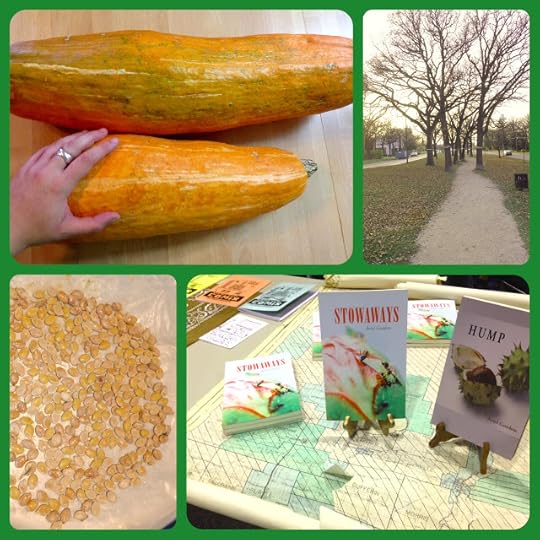
* * *
I thought it might be time for an update on my to-ings and fro-ings, which is to say what I've been doing when not launching 10 University of Manitoba Press titles (i.e. for my day-job)...
I've been doing lots of preserving and eating of the preserves intended for winter of late. The weather was so nice that my CSA, Jonathan's Farm, extended their season from 18 to 20 weeks. So: lots of fruit and veg to process into jam and soup, lots of canning paraphernalia to hoist out of and then return to the basement. All my soup pots dirty/clean/dirty.
I was especially excited, though, when I got my hands on two of the squash grown from 800-year-old seed by CMU Farms, thanks to Paul Dyck and Sally Ito.
Here's a bit of information about the origins of the squash from Owen Taylor, a Philadelphia-based seed-saver who got his hands on some of the seed: "This is the squash whose seeds were found, 800 years old, in a clay ball on the Menomonee reservation in Wisconsin during an archeological dig. Winona Laduke from the White Earth Land Recovery Project named it 'Cool Old Squash' in Anishinaabe: Gete Okosomin."
I carried these two squash home from Paul & Sally's house on my back, and they nearly squished me.
My squash came with a caveat from CMU Farms: "The squash we are selling are the extras from our seed saving project and have not been hand pollinated, so the seeds will not be genetically pure. If you save and plant these seeds, you may have some that will produce the same kind of squash but they may also have cross-pollinated with other squash in our area and the resulting squash may look very different. You are still welcome to save them if you want, but you should know that the result will not be what you expect."
According to Taylor, the squash will only cross-pollinate with other members of the Curbita maxima family, for instance Hubbard or Buttercup squash. So, hybrids or no, I kept the seeds from the one squash we've baked off/eaten/frozen and have offered them to writer/friends with gardens. I think even the hybrids will be interesting...
I've also been walking a fair bit through this long sunny fall we've been enjoying and thinking about what it means to live in a treed city. I've written or am writing two or three essays on the subject and am mostly just waiting for a period where I have more time and energy.
Like maybe tomorrow. Or this weekend.
Finally, I read at Canzine Central, which is a zine and underground art festival that happened October 24 at the Millennium Library. I was hoping to make broadsheets for the event, but the week previous was punishing...so I didn't manage it. But the reading was varied and good and it was good to see what people were doing, what they were making.
Published on October 29, 2015 13:26
October 15, 2015
Reprint: Go Fly a Kite
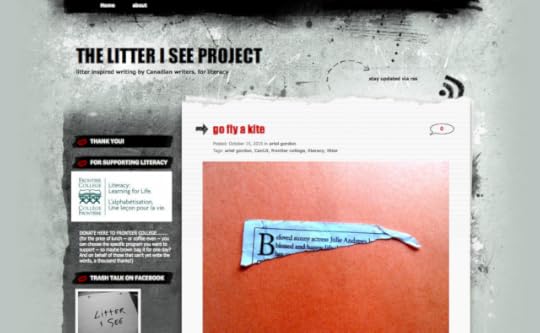
* * *
So I contributed a prose poem to Carin Makuz' The Litter I See Project: litter inspired writing by Canadian writers, for literacy.
The project is supposed to benefit Frontier College, which has "been recruiting dedicated volunteers to work with Canadian children, youth and adults from all over Canada since 1899." Frontier College also organizes the Giller Light Bashes around the country...
Carin sent me this image of a scrap of paper and asked me to write something.
I immediately fastened on the words/concept "Julie Andrews." I mean, she gamboled through the fields of my childhood, looking radiant and behaving sensibly. But she was the ultimate maiden (Maria) and crone (Mary Poppins): even though she was providing all kinds of childcare, she was removed, somehow, from the grit of it all. She made it look easy, as long as you had a magic carpetbag and some spare curtains.
And nothing about trying to balance a job and a partner, a child and a house, is easy.
So this is my fanciful pushback, including taking the title of Mary's anthem "Let's Go Fly a Kite" and shortening it to "Go Fly a Kite," which is what my mother advised me to tell the people who were picking on me in elementary school.
Published on October 15, 2015 08:31
October 12, 2015
Bats and bats and niche
 Photos by Mike Deal.* * *
Photos by Mike Deal.* * *Here are a few pictures from the McNally's launch of Basma Kavanagh's Niche on Saturday night.
I read an excerpt from my essay on bats in-the-walls. With some anxiety, because it is so new.
And Basma read a variety of poems from Niche, including one with a reference to Little Brown Bats. Which we had sort of planned in advance but still made me giggle in the moment. If you aren't familiar with Basma's work, Niche is a great place to start. I really deeply admire this book...
My thanks to Charlene Diehl and the Winnipeg International Writers Festival for the conversation, to Michael Deal for the photos, and to Kristian Enright and McNally's for the gorgeous hospitality...
Published on October 12, 2015 10:08

